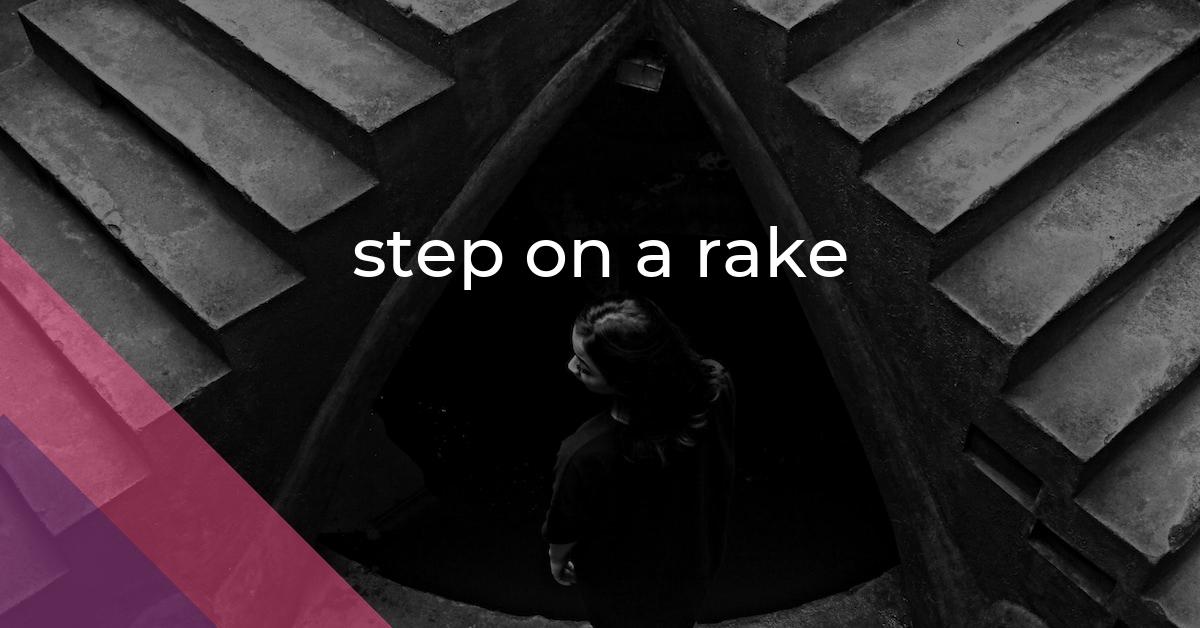step on a rake: Idiom Meaning and Origin
What does ‘step on a rake’ mean?
The idiom "step on a rake" means to accidentally encounter or experience an unexpected and often painful or embarrassing consequence as a result of one's own actions or decisions.

Idiom Explorer
The idiom "tread on someone's toes" means to offend or irritate someone by encroaching on their territory, interfering with their affairs, or acting in a way that they perceive as a violation. It implies crossing boundaries and causing resentment in the process.
The idiom "the chickens come home to roost" means that negative consequences or troubles from previous actions will eventually catch up to a person.
The idiom "teach someone a lesson" means to make someone experience an unpleasant consequence in order to discipline or show them the negative consequences of their actions.
The idiom "taste of one's own poison" means to experience the negative consequences of one's own harmful actions or words.
The idiom "take the plunge" means to take a significant and often risky step or action, especially when committing to something new or unknown.
The idiom "take the fall" means to accept blame or punishment for a mistake or wrongdoing, often to protect someone else or to avoid greater consequences.
The idiom "take the bait" means to fall for a trick or deception, often by reacting exactly as the trickster desires, thus becoming trapped or manipulated.
The idiom "take its toll" means that something has a negative impact or effect on someone or something, usually resulting in damage, exhaustion, or loss. It implies that there are consequences or consequences to be paid for a particular action or situation.
When someone takes a tumble, they fall down or have a sudden accident.
The idiom "take a stab at" means to make an attempt or try something, often without being sure of the outcome or success.
The Surprising Sting
The idiom "step on a rake" is a well-known phrase used in English-speaking countries. It is primarily used as a metaphor to describe a situation where someone unknowingly or accidentally repeats a mistake or encounters an unexpected negative consequence.
Originally, the idiom derived from the physical act of stepping on a rake. This act can result in the wooden handle of the rake hitting the person's face, creating a comedic and unexpected accident. This physical comedy element is often associated with the idiomatic meaning of the expression.
The exact origins of the idiom "step on a rake" remain uncertain, as it has been in use for many years. However, it is commonly used in spoken language and can be found in various written forms, including literature, newspapers, and online content.
The versatility of this idiom allows it to be used in a wide range of contexts, often with a humorous or sarcastic tone. It can be employed to criticize someone's repeated mistakes, lack of awareness, or even to describe a situation where someone unintentionally causes harm to themselves or others.
Another related idiom is "step on someone's toes". This phrase is often used to describe the act of accidentally interfering with someone's plans or actions. It can imply that the person inadvertently offended or angered someone else by getting involved in their affairs without permission. In a similar vein, "tread on someone's toes" carries a similar meaning, emphasizing the unintentional interference or offense caused to someone.
The idiom "put one's foot in it" is yet another related phrase. It expresses the act of saying or doing something unintentionally foolish or embarrassing that may offend or upset others. It is often used to describe situations where someone unintentionally says the wrong thing or makes a mistake, resulting in an awkward or uncomfortable situation.
The idiom "rake over the coals" is an expression used to describe the act of rehashing or revisiting a past mistake or wrongdoing. It often implies that someone is being excessively criticized or scrutinized for their previous actions. Similar to this idiom, "fall on one's face" refers to experiencing a dramatic failure or embarrassment. It suggests that someone's plans or endeavors did not go as expected and resulted in a humiliating or disappointing outcome.
These related idioms add depth to the concept of "step on a rake", highlighting different aspects of unintentional actions, mistakes, and their consequences. They contribute to the rich and varied language that English offers, allowing speakers to convey nuanced meanings and emotions in their conversations.
Given the widespread use and understanding of these idioms, it is clear that they have become ingrained in the English language. Native speakers can easily recognize and relate to them, using them in everyday conversations or even in more creative works, such as cartoons, plays, and movies.
To summarize, the idiom "step on a rake" is a well-known phrase with a metaphorical meaning. Its origins may be unclear, but it has been in use for a long time and is commonly used to describe situations involving unexpected consequences or repeating mistakes. The related idioms "step on someone's toes", "put one's foot in it", "tread on someone's toes", "rake over the coals", and "fall on one's face" further contribute to the understanding of unintentional actions, mistakes, and their outcomes in the English language.
Example usage
Examples:
- John stepped on a rake and the handle hit him right in the face.
- She didn't see the rake on the ground and ended up stepping on it.
- The comedian made a joke that caused the whole audience to step on a rake of embarrassment.
Analysis:
The idiom "step on a rake" is used to describe a situation where someone unintentionally encounters a painful or embarrassing consequence. It originates from the physical act of stepping on a garden rake, causing the rake's handle to suddenly swing up and strike the person. In a figurative sense, the idiom implies an unexpected negative outcome resulting from an innocent or inadvertent action.
In the given examples, the idiom is applied in different contexts. The first example depicts a literal instance where someone accidentally steps on a garden rake, causing it to hit them in the face. The second example illustrates a similar literal usage where someone unknowingly steps on a rake lying on the ground. The third example demonstrates a figurative use of the idiom, where the comedian's joke creates an awkward or embarrassing atmosphere, causing the whole audience to metaphorically "step on a rake" of embarrassment.
More "Mistake" idioms



